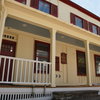BKW budget proposals didn't play out as predicted
The Enterprise — Marcello Iaia
A new format debuted at the Feb. 10 Berne-Knox-Westerlo School Board meeting, with the audience separated into groups of chairs on either side of a podium, and tables in a horseshoe shape. Board President Joan Adriance said the change was influenced by Guilderland School Board meetings and meant to focus board members more on one another and less on a free exchange with the audience.
BERNE — The budding discussion on the next district budget at Berne-Knox-Westerlo is showing choices are likely be much harder than last year.
At a Feb. 23 work session, school board members Joan Adriance and Earl Barcomb gave 2 percent as a tentative maximum increase to the tax levy.
“Until we restructure this district, we’re wasting our money — zero,” Vasilios Lefkaditis gave as his guideline in the ensuing budget process, saying earlier he hadn’t received the necessary reports on student achievement on which to base his decision.
During the meeting, Lefkaditis claimed the district was misled last year into costly union contracts and failed savings plans, echoing concerns he sounded last year about the sustainability of large changes that were made to the district’s budget and contracts.
Those changes were made under Interim Superintendent Lonnie Palmer. He was replaced this year with another interim superintendent, Joseph Natale, for another one-year stint. The district is currently looking to have a permanent superintendent and a secondary school principal hired by the end of the school year while developing next year’s spending plan.
When Lefkaditis suggested 2 percent wasn’t enough of an increase to solve the budgetary challenges faced by the district, Business Official Lauren Poehlman agreed, saying she nonetheless thinks that is what the board will likely approve. Poehlman is new to her post at BKW this year.
It was the first of several meetings among board members and the citizens’ budget advisory committee in which the budget will be hashed out before it is approved in April and voted on by district residents in May.
Speaking to the budget advisory committee on Feb. 23, Natale proposed a plan totaling $22.78 million, a 3.9-percent spending increase of $865,610 over this year, but did not include a proposal for the tax levy or an estimate of revenues. Like school districts across the state, BKW has no way of knowing what its state aid will be for next year as Governor Andrew Cuomo has said his proposed $1.1 billion in aid to schools,, a nearly 5-percent increase over this year, will be tied to the legiislature passing his reforms; additionally his office has not released the traditional "runs," or estimates of aid for each district.
Most of the increase proposed by Natale is to fund the plan, similar to its current form, with additional money, partly to make up for under-budgeted wages from this year and move the business office from a low of 2.4 full-time employees, down from six the year before, up to five next year.
Natale reminded the board it was not a final recommendation, saying he was still investigating to what extent the district should use a central business office through the Board Of Cooperative Educational Services.
“I’m tipping my hat to let you know where I’m looking, that’s all this is” Natale told the board, speaking of the business office which had trouble keeping up with purchase orders earlier in the school year, “It cannot — it cannot go on the way it is.”
While board members last year took a firm stance on taxes for the current budget — voting for no increase to the overall amount to be raised from property owners — it had roughly $1 million in projected savings to move around in new areas of instruction and training teachers.
Much of the planned savings came from shared services, including the reduction to the business office, which involved sharing Poehlman between BKW and Duanesburg.
“On top of that, you had three or four contracts that were settled, major adjustments to health insurance, salaries…,” Natale added.
In December, the shared business official agreement was scrapped and Poehlman resigned from Duanesburg effective in January.
Nearly half of Natale’s proposed increase comes from the increased wages, which board members asked Poehlman to detail for a future meeting. Out of the $866,000 increase, another $160,000 is for debt service and transfers, $170,000 is for BOCES services, $141,000 is for the business office, $28,800 is for supplies, and $3,300 is for contractual expenses.
An assessment presented by Natale at the Feb. 23 board meeting showed savings and spending over the 2014-15 school year are both now projected to be lower than planned, with a total gap of roughly $150,000.
Calculations made last year have thus far this school year been unrealized in two different directions. First, some of the planned improvements didn’t take place, thereby saving money over what was projected. Second, calculated savings didn’t materialize, creating a net loss.
The reasons given varied for each item, including a lack of qualified candidates for filling seven new teaching-assistant positions with certified teachers in the elementary school. Teachers took on the task of instructing just two out of nine available slots for enrichment classes in subjects like art history and American history through film, for which the budget allocated money. To Lefkaditis’s disappointment, no math teachers taught extra classes.
On the savings side, reality didn’t meet the budget’s design either.
For example, two of the five bus runs planned for consolidation actually resulted in savings, along with one of several bus aide positions that weren’t supposed to be needed.
Food Services Director Deborah Rosko reported on the success of her savings regimen, which included a significant cut to her staff, consolidating cooking to one kitchen, with food served in two schools. Rosko in her role as director is shared between BKW and Greenville.
But the cuts have meant an adult-meals program for faculty, staff, and parents, which had been a good source of revenue, has been compromised, and, with the influence of stringent nutrition regulations, a separate snack bar with a variety of options was reduced and made part of the regular lunch line. And the goal of the cuts — to balance revenue with expenses for food services, a challenge nationwide — has come closer, but not been realized.
“We all keep fighting the fight,” said Rosko.

